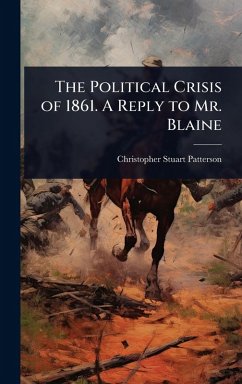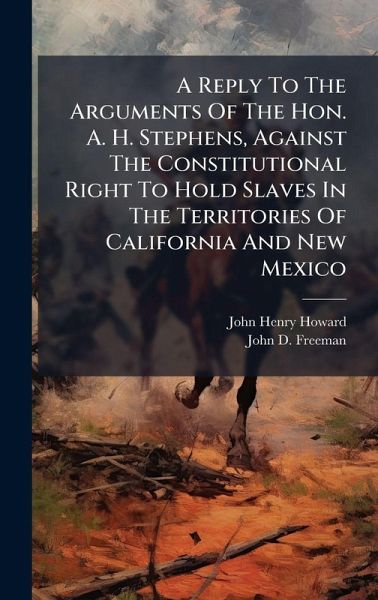
A Reply To The Arguments Of The Hon. A. H. Stephens, Against The Constitutional Right To Hold Slaves In The Territories Of California And New Mexico
Versandkostenfrei!
Versandfertig in über 4 Wochen
26,99 €
inkl. MwSt.
Weitere Ausgaben:

PAYBACK Punkte
13 °P sammeln!
In "A Reply To The Arguments Of The Hon. A. H. Stephens, Against The Constitutional Right To Hold Slaves In The Territories Of California And New Mexico," John Henry Howard and John D. Freeman present a detailed legal and political response to Alexander H. Stephens's defense of slavery in newly acquired territories. This work dissects Stephens's arguments, challenging his interpretation of constitutional law and the rights of slaveholders to extend their practices into California and New Mexico. Published during a period of intense national debate over slavery's expansion, this book provides v...
In "A Reply To The Arguments Of The Hon. A. H. Stephens, Against The Constitutional Right To Hold Slaves In The Territories Of California And New Mexico," John Henry Howard and John D. Freeman present a detailed legal and political response to Alexander H. Stephens's defense of slavery in newly acquired territories. This work dissects Stephens's arguments, challenging his interpretation of constitutional law and the rights of slaveholders to extend their practices into California and New Mexico. Published during a period of intense national debate over slavery's expansion, this book provides valuable insights into the legal justifications and counter-arguments that fueled the sectional conflict leading up to the Civil War. Howard and Freeman's meticulous rebuttal offers a significant contribution to the understanding of the complex constitutional questions at the heart of the slavery debate, making it an essential resource for historians and legal scholars studying the era. This work has been selected by scholars as being culturally important, and is part of the knowledge base of civilization as we know it. This work was reproduced from the original artifact, and remains as true to the original work as possible. Therefore, you will see the original copyright references, library stamps (as most of these works have been housed in our most important libraries around the world), and other notations in the work. This work is in the public domain in the United States of America, and possibly other nations. Within the United States, you may freely copy and distribute this work, as no entity (individual or corporate) has a copyright on the body of the work. As a reproduction of a historical artifact, this work may contain missing or blurred pages, poor pictures, errant marks, etc. Scholars believe, and we concur, that this work is important enough to be preserved, reproduced, and made generally available to the public. We appreciate your support of the preservation process, and thank you for being an important part of keeping this knowledge alive and relevant.



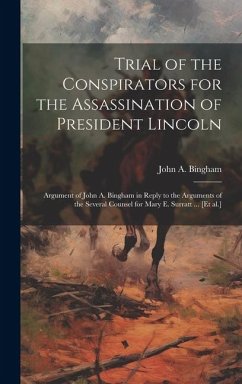
![Address of the Hon. Charles L. Scott, of California, to his Contituents on the Constitutional Right of Secession [microform] Cover Address of the Hon. Charles L. Scott, of California, to his Contituents on the Constitutional Right of Secession [microform]](https://bilder.buecher.de/produkte/74/74793/74793286n.jpg)
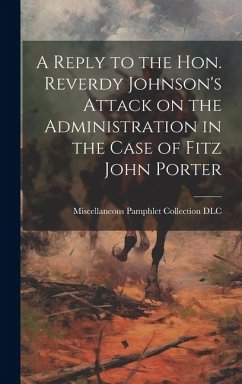
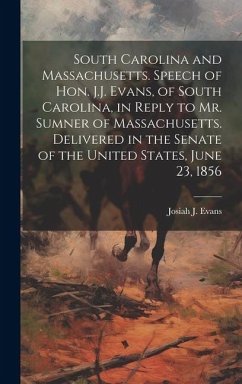
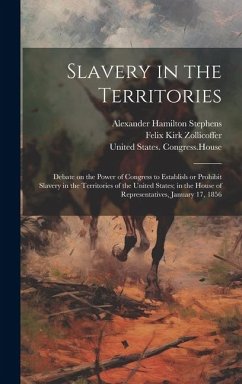

![Abraham Lincoln's Speech at Peoria, Illinois [Oct. 16, 1854] in Reply to Senator Douglas. Seven Numbers of the Illinois Daily Journal, Springfield, Oc Cover Abraham Lincoln's Speech at Peoria, Illinois [Oct. 16, 1854] in Reply to Senator Douglas. Seven Numbers of the Illinois Daily Journal, Springfield, Oc](https://bilder.buecher.de/produkte/71/71582/71582203n.jpg)


